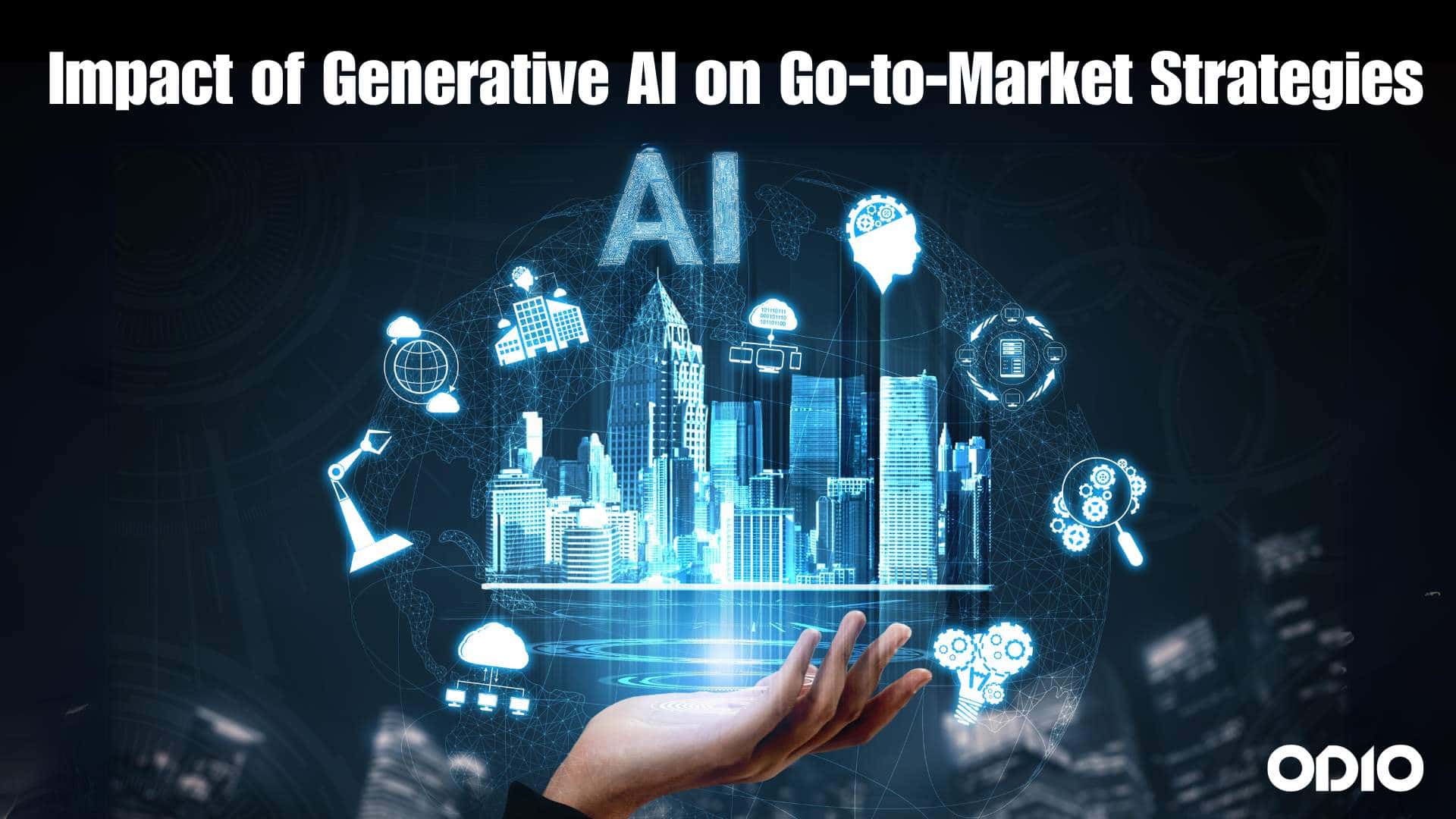
Staying ahead of the curve is paramount for businesses striving for success in their Go-to-Market strategies in present market. With the advent of Generative AI, the paradigm of sales automation, marketing campaigns, and overall GTM strategies has undergone a revolutionary transformation. According to a recent study by Forbes, companies that leverage AI in their GTM strategies witness a 50% increase in leads and appointments, along with a whopping 40% reduction in costs. As we delve deeper into the realm of Generative AI, let’s explore its profound impact on modern business strategies.
What is Generative AI?
Generative AI, a subset of artificial intelligence, refers to technology capable of producing new content, such as text, images, or audio, autonomously, thereby revolutionizing Go-to-Market strategies. Unlike traditional AI systems that rely on predefined rules and datasets, Generative AI harnesses the power of neural networks to generate original content based on patterns learned from vast amounts of data. This enables machines to exhibit creativity and produce human-like outputs.
How Generative AI Works?
At its core, Generative AI operates through neural networks, specifically designed to mimic the human brain’s ability to generate and process information, facilitating innovative Go-to-Market strategies. These networks consist of interconnected nodes that analyze input data, learn from it, and generate new content accordingly. By iteratively refining their algorithms through training on massive datasets, Generative AI models can produce increasingly sophisticated and realistic outputs.
The Rise of Generative AI in Go-to-Market Strategies
Generative AI has witnessed a meteoric rise in recent years, driven by advancements in deep learning algorithms and computing power, significantly impacting Go-to-Market strategies. Historically, the roots of Generative AI in GTM strategies can be traced back to the early 2010s, with the emergence of recurrent neural networks (RNNs) and convolutional neural networks (CNNs). However, it wasn’t until the introduction of generative adversarial networks (GANs) by Ian Goodfellow and his colleagues in 2014 that the field truly began to flourish.
Historical Context and Development
The journey of Generative AI in Go-to-Market strategies traces back to the foundational work of pioneers like Alan Turing and John von Neumann, who laid the groundwork for modern computing and artificial intelligence. Over the decades, incremental advancements in machine learning algorithms, coupled with exponential growth in computational resources, propelled the evolution of Generative AI from a theoretical concept to practical application in GTM strategies.
Key Milestones in Generative AI Research
Significant milestones in Generative AI research include the development of Variational Autoencoders (VAEs) in 2013, which enabled efficient learning of complex probability distributions, and the inception of GPT (Generative Pre-trained Transformer) models by OpenAI in 2018, revolutionizing natural language processing tasks relevant to GTM strategies. These breakthroughs paved the way for a new era of creativity and innovation in AI, transforming GTM strategies.
Understanding ChatGPT for Go-to-Market Strategies
Among the myriad of Generative AI models, ChatGPT stands out as a versatile and powerful tool for facilitating human-like interactions in various domains, including Go-to-Market strategies.
What is ChatGPT?
ChatGPT, a variant of the GPT series developed by OpenAI, is designed specifically for conversational applications, making it invaluable for Go-to-Market strategies. Leveraging the transformer architecture, ChatGPT excels in understanding context, generating coherent responses, and simulating meaningful conversations with users, enhancing GTM strategies.
Capabilities and Applications in Go-to-Market Strategies
ChatGPT finds widespread applications in customer service, virtual assistants, and content generation, crucial elements of Go-to-Market strategies. Its ability to comprehend nuances of language and maintain context makes it invaluable for enhancing customer interactions, automating support processes, and even generating personalized marketing content, optimizing GTM strategies.
More Generative AI Models and Their Impact on Go-to-Market Strategies
While ChatGPT stands as a prominent example of Generative AI for Go-to-Market strategies, several other models have emerged with unique features and capabilities, shaping GTM strategies in diverse ways.
Of course! Here’s the update with Gemini replacing BERT:
Other Prominent Generative AI Models
While ChatGPT has been a leader, the field of generative AI is constantly evolving. Other notable models include:
- Gemini (Google’s Most Capable Multimodal Model): This powerful model can handle various tasks, including text and image understanding, code generation, and advanced reasoning. Its potential applications are vast and still being explored.
- DALL-E: DALL-E 2, the latest iteration, has pushed the boundaries of image generation with its ability to create realistic and creative visuals from text descriptions.
- GANs (Generative Adversarial Networks): These models have advanced the field of generative art and can be used to create novel and interesting visual content.
These models, along with others under development, are making significant contributions to various fields, influencing Go-to-Market (GTM) strategies in numerous ways.
Comparison with ChatGPT and Unique Features
ChatGPT remains a strong player, particularly for its conversational AI strengths and ability to generate relevant responses in a dialogue. This is valuable for chatbots, customer service applications, and interactive experiences. However, depending on the specific GTM needs, other models offer distinct advantages:
- Gemini: With its multimodal capabilities, Gemini can analyze text data, understand customer sentiment and intent, and even generate creative marketing copy.
- DALL-E 2: Allows for the creation of unique and eye-catching visuals for advertising and product presentations.
- GANs: May be used to generate new product designs or marketing materials with a creative flair.
Exploring these various models and their capabilities can lead to more effective and innovative GTM strategies.
How Generative AI Can Help in Sales and Go-to-Market Strategies
Generative AI holds immense potential in transforming sales processes and optimizing Go-to-Market strategies, offering a range of benefits that streamline operations and enhance customer engagement.
- A. Personalized Customer Interactions: In the realm of sales and Go-to-Market strategies, personalized customer interactions are paramount for fostering meaningful connections and driving conversions. Generative AI enables businesses to create tailored communication experiences by generating personalized responses and recommendations based on individual preferences and behavior, thereby optimizing GTMstrategies.
- B. Streamlining Customer Support: Efficient customer support is crucial for maintaining customer satisfaction and loyalty, essential elements of successful Go-to-Market strategies. Generative AI can streamline support processes by automating routine inquiries, providing instant responses, and escalating complex issues to human agents, ensuring prompt and effective resolution, crucial for GTM strategies.
- C. Content Generation for Marketing Campaigns: Compelling content lies at the heart of effective marketing campaigns, playing a pivotal role in capturing audience attention and driving engagement, key objectives of Go-to-Market strategies. Generative AI empowers marketers to generate high-quality content at scale, from blog posts and social media updates to email newsletters and product descriptions, optimizing GTM strategies.
- D. Lead Generation and Qualification: Identifying and nurturing leads is essential for fueling sales pipelines and driving revenue growth, central to successful Go-to-Market strategies. Generative AI can assist in lead generation by analyzing customer data, predicting buying intent, and generating targeted outreach strategies, streamlining the lead qualification process and accelerating sales cycles, vital for GTM strategies.
Future of Generative AI with Sales and Businesses’ Go-to-Market Strategies
As Generative AI continues to evolve, its integration into sales processes and Go-to-Market strategies holds immense promise for driving innovation, efficiency, and competitiveness in the business landscape.
Integration with CRM Systems
The seamless integration of Generative AI with Customer Relationship Management (CRM) systems enables businesses to leverage rich customer data and insights to personalize interactions, automate tasks, and optimize workflows, enhancing sales efficiency and effectiveness in Go-to-Market strategies.
Sales Forecasting and Decision-Making
Generative AI empowers businesses with advanced predictive analytics capabilities, enabling accurate sales forecasting and informed decision-making, critical components of successful Go-to-Market strategies. By analyzing historical data and market trends, Generative AI enables organizations to anticipate customer needs, identify growth opportunities, and allocate resources strategically, maximizing ROI in GTM strategies.
Automating Repetitive Tasks in Sales Processes
The automation of repetitive tasks in sales processes through Generative AI frees up valuable time and resources, enabling sales teams to focus on high-value activities such as relationship building and strategic planning, essential for successful Go-to-Market strategies. From data entry and lead qualification to scheduling and follow-up, Generative AI streamlines workflows and increases productivity, driving efficiency and agility in GTM strategies.
Ethical Considerations and Challenges
While Generative AI offers tremendous potential for transforming sales and Go-to-Market strategies, it also raises ethical considerations and challenges related to data privacy, bias, and accountability. Businesses must proactively address these issues through robust governance frameworks, transparency, and responsible AI practices to build trust and ensure ethical use of Generative AI in GTMstrategies.
Generative AI for Transformative Go-to-Market Strategies
It is impossible to overestimate the revolutionary potential of generative AI in reshaping go-to-market strategies as we traverse the always changing world of sales and marketing. Generative AI provides businesses with a plethora of options to innovate, optimize, and flourish. These opportunities range from tailored customer encounters to streamlined support operations and content generation for marketing campaigns.
Businesses may achieve unprecedented levels of efficacy, flexibility, and efficiency in their GTM initiatives by utilizing Generative AI, giving them a competitive advantage in the fast-paced market of today. Future developments include the potential to completely transform the way we approach sales and marketing through the automation of repetitive operations, improved sales forecasting, and the integration of Generative AI with CRM systems.
However, as we embrace this transformative technology, it’s imperative to remain mindful of ethical considerations and challenges, ensuring responsible and ethical use of Generative AI in GTMstrategies.
Question for Reflection and Action: How will your business harness the power of Generative AI to elevate its Go-to-Market strategies and drive success?
Share your thoughts and take the first step towards a more innovative and effective approach to sales and marketing.
Thank you for reading. We hope this blog has been helpful in providing you with valuable information. Share your thoughts in the comments to have a conversation on why redaction is important for your contact center. For more insightful blogs like this, please follow our blogs at Odio.

